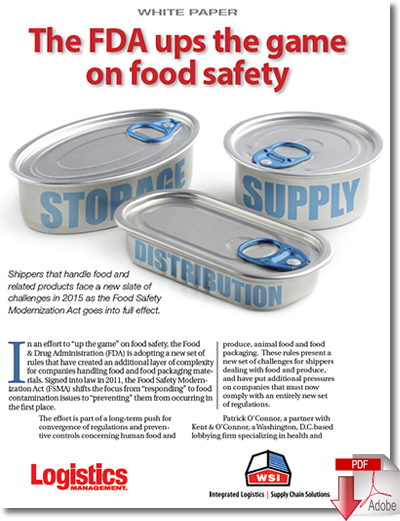Congress Should Prioritize Food Safety Modernization Funding

Signed into law by President Obama in 2011, the FSMA enables the FDA to better protect public health by strengthening the food safety system.
In 2011, Congress passed and President Obama signed into law the Food Safety Modernization Act (FSMA).
Heralded as “the most sweeping reform of our food safety laws in more than 70 years” and supported by industry, consumer groups, and legislators on both sides of the aisle, the Act aims to modernize the way we ensure the safety of our food at each step in the supply chain.
Since then, the Food & Drug Administration has already proposed seven sets of rules that, when finalized, will help shift the country’s food safety infrastructure from reactive to preventative.
However, adequate funding to fundamentally change how the FDA proactively responds to and prevents food contamination is in jeopardy.
At Nestlé, our products are in 97 percent of American households, and we recognize that food companies have a responsibility to the public and hold all of our foods and beverages – from baby food to bottled water – to the highest safety and quality standards. We will continue to fill this role and meet this responsibility, and we’re supportive of the changes FSMA will bring.
But FSMA’s rollout is no easy feat, and successful implementation of the law will require active participation from many stakeholders. The paradigm shift envisioned by FSMA has expanded the FDA’s role in verifying the effectiveness of food safety controls throughout the food chain, and the Agency has developed a sound operational plan to meet this daunting task. Base funding increases appropriated to the FDA since the Act’s passage are a start, but, with these increases totaling just half of what the Congressional Budget Office said the Agency would need through this year, it’s just not enough.
The successful rollout of changes of this magnitude requires a clear strategy and substantial effort up front. Initiatives that have been inadequately resourced or are poorly executed often result in confusion and inefficiency, which can take years to resolve. In hindsight, the cost of poorly implemented programs are often much greater than the upfront cost of providing adequate resources and planning to the rollout of the program.
It’s critical to all stakeholders – the consumer and the industry – that the FDA has sufficient bench strength to implement and verify the preventative approach to food safety that FSMA envisioned.
Tackling FSMA Through Food Safety Programs
Clearly, the impact of FSMA on shippers handling the products that the law covers will be expansive. To help them effectively navigate the process, 3PLs have stepped up to the plate and offered up a host of services designed to ease the burden.
“Once the FSMA went into effect, we re-registered our facilities under the new act,” says Ryan Hannam, operations director at integrated logistics provider WSI. “We handle food products for many shippers and are knowledgeable of the regulations. In turn, we can make sure that companies’ products are protected as they move through the supply chain.”
As part of that commitment, WSI has created a food safety program that is applied to all its’ food-grade facilities. Within that program, Hannam says that the 3PL addresses all of the important FDA regulated areas as well as state and local regulations.
“We focus on everything from pest control to good manufacturing processes to product recalls, and everything in between,” says Hannam, “all with an eye on helping shippers most efficiently and effectively navigate existing and future compliance requirements.” With a large portion of the FSMA centered on documenting processes, WSI also handles facility cleaning and pest control schedules, documentation of those schedules, the tracking of inbound and outbound loads, and the documenting of vehicle seal numbers.
This lack of funding is a significant roadblock to critical food safety modernization: Advancements like specialized training for inspectors, collaboration with food safety authorities at home and abroad, technical assistance to small food producers, and implementation of a mechanism that, for the first time, would hold importers responsible for the food they bring into the country. For smaller companies, an adequately funded FSMA will level the playing field by offering support for those who need help in meeting food safety standards, as well as provide clarity from the FDA regarding the industry’s responsibility in preventing food safety issues through rules, regulations and guidance documents.
Congressional leaders know that Americans strongly support a safer, modernized food safety system. As the appropriations process is kicking into high gear, this is the year to make that goal a reality. While we work to do our part, we urge Congress to realize the importance of adequately funding FSMA to ensure the extensive updates required of the food safety system come to fruition.
As the Appropriations Committees begin to make key decisions about funding levels for Fiscal Year 2016, we hope congressional leaders will provide enough additional funding to give the FDA the resources it needs to fully implement FSMA as soon as possible, including meeting the president’s budget request for an appropriation of $109.5 million in 2016.
Americans deserve to have confidence in the foods they feed their families, whether they are produced around the corner or across the globe. As the food supply is becoming increasingly global, Congress now has an unprecedented opportunity to make strides for food safety. With all the important issues on their figurative plates, lawmakers should prioritize the safety of the food on yours. We can’t afford to wait.
Source: The Hill
About Tim Jackson

Director of Food Safety Nestlé North America
In this role since 2009, he leads food safety programs in hygiene and sanitation; management and monitoring of microbiological, chemical and physical hazards; thermal processing; and food safety management. He serves on the corporate crisis and issue management teams and provides leadership and support to Nestle factories and businesses in the development and technical acceptance of new products.
Article Topics
WSI News & Resources
The Government’s Role in Food Safety How FSMA Will Impact Shippers in 2015 and Beyond Congress Should Prioritize Food Safety Modernization Funding 2015 FDA Regulations will Place new Pressure on Shippers 25 Years of Third-Party Logistics Research & Studies Shippers Condition Index Points to Ongoing Tough Market Conditions for Shippers Intermodal Service Issues Persist But Conditions Are Slowly Improving, Say Carriers and Analysts More WSILatest in Business
Ranking the Top 20 Women in Supply Chain TIm Cook Says Apple Plans to Increase Investments in Vietnam Amazon Logistics’ Growth Shakes Up Shipping Industry in 2023 Spotlight Startup: Cart.com is Reimagining Logistics Walmart and Swisslog Expand Partnership with New Texas Facility Nissan Channels Tesla With Its Latest Manufacturing Process U.S. Manufacturing Gains Momentum After Another Strong Month More Business














